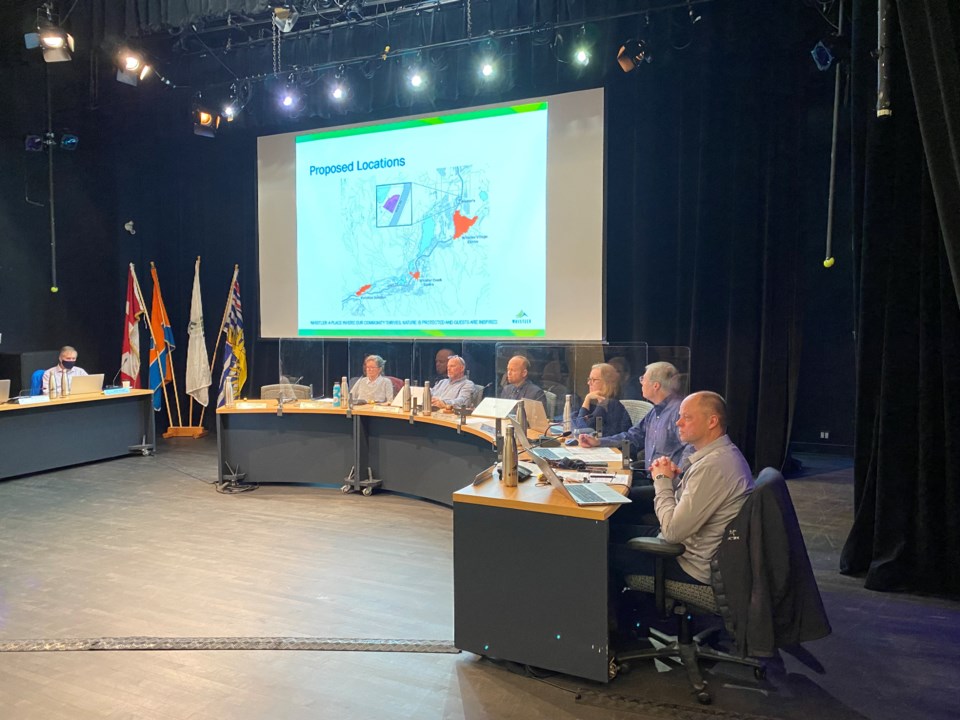Whistler’s mayor and council gave its assent to proposed 2022 budget guidelines at the Dec. 21 council meeting, but the decision wasn’t unanimous.
The guidelines propose a 6.72-per-cent property tax increase and three-per-cent increases to sewer, solid waste and water parcel fees.
Councillor Ralph Forsyth was the lone dissenting vote, noting he said during the 2018 election campaign that he would never support a tax increase of more than four per cent.
“So I’m not going to, but not just because I’m an obstinate malcontent, and think that it should only be at four per cent. When this passes as I assume it does, I will defend it with all the vigour of my colleagues that do support it, because many of their reasons are justifiable,” Forsyth said. “But I can rest peacefully [with] my opposition in this because there are several items in here that I’ve already voted against.”
As she explained at the budget open house on Nov. 18, the 2022 budget aims for “true resiliency,” said director of finance Carlee Price—a state where the municipality can respond to new challenges as they arise (like pandemics, climate change or cyber attacks) while still remaining financially healthy.
But in order to get there, “some changes to funding are required,” Price said. “[And] the 2022 budget addresses several existing challenges in a measured way.”
After “smaller-than-necessary” tax requisitions in previous years, the Resort Municipality of Whistler (RMOW) must make up for “a long period of constrained reserve contributions,” Price added.
“In this case, we’re proposing a multi-year process,” she said.
“This is not the sort of problem that can be solved in a single year—2022, however, marks an important beginning in the sense of those reserve contributions … delaying the first step on this journey is dangerous to the long-term fiscal health of the organization.”
As it now stands, the RMOW’s reserves are too low relative to its asset base, and growing too slowly, Price said.
Projecting out to 2049, the RMOW should be spending $8 million each year to renew existing assets (plus an additional $600,000 annually), but is currently only contributing $6.3 million to the general fund, she explained.
“If we assume it takes four years to get to the right level of contributions on the general capital fund, that requires an increase of $500,000, approximately, each year for the next four,” she said.
Factoring in the estimated $600,000 annual cost increase, the RMOW needs to put away an additional $1.1 million each year through 2026 before year-over-year increases can fall again.
“That’s about a 2.5-per-cent per year tax increase just to get those reserves back to healthy levels,” Price said.
“These numbers will change slightly as the asset management plan work continues, [but] we don’t expect them to change dramatically.”
Being the unique (and relatively young) community that it is, much of Whistler’s infrastructure was installed all at once, and all comes due for replacement at roughly the same time.
“We see a different pattern to replacement than might be evident in other communities, and some of the reason for the big increases in the required reserve contributions have to do with that,” Price said.
“In the first 30 years, for example, there weren’t a lot of these big, expensive assets that needed wholesale repairs and replacements. We’re seeing that much more frequently today. You can expect the same going forward.”
As in every year, the tax increase will impact households differently.
In an example provided by the RMOW, a property assessed at $1.5 million could expect to see an increase in property taxes of $155 next year, while one assessed at $4 million might see an increase of $415.
The change to sewer, water and solid waste fees will amount to about a $36.15 increase for all properties.
Though residential assessments in Whistler are expected to rise sharply this year, commercial properties will likely stay flat—which should be good news for business owners after commercial property taxes went up significantly last year, noted Coun. John Grills.
“If their taxes are relatively flat, or slightly up, it’s certainly better than what they experienced this year, so hopefully that plays out,” he said.
Overall, council was supportive of the drive for financial resiliency.
“I’ve had some interesting conversations this week on the budget, and you can’t have it both ways,” said Coun. Arthur De Jong. “I had requests [about] specific services; accelerate climate action and FireSmart but don’t raise taxes—nevermind reserves and inflation,” he said.
“So I find 6.72 and three per cent are carefully measured, and we can’t find ourselves in financial reserve quicksand, so I certainly support this.”
Mayor Jack Crompton agreed, and thanked staff and council for their work on the budget.
“I think it’s important as a community that we have our eyes on the horizon,” he said. “I think that there’s a lot of work to do around climate, around recovery from COVID, and around ensuring that this is a resilient and robust organization—this budget does that, and I’m grateful for the work that you’ve put into it.”
The Five-Year Financial Plan bylaw will be back in front of council at the first meeting of 2022, scheduled for Jan. 11.
Municipal tax bylaws must be adopted before May 15.
Find more info at whistler.ca/budget.




